
Acacia alpina is an evergreen shrub that is endemic to south eastern Australia.

Acacia chrysochaeta is a shrub belonging to the genus Acacia and the subgenus Juliflorae that is endemic to a small area of north western Australia.

Acacia clelandii, also known as umbrella mulga, is a shrub belonging to the genus Acacia and the subgenus Juliflorae that is native to arid parts of central Australia.
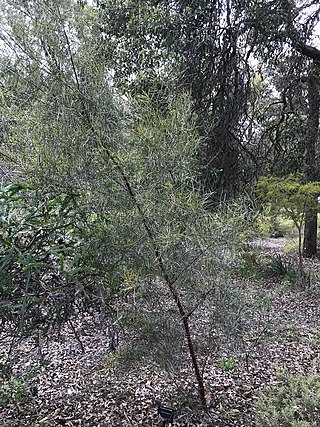
Acacia fauntleroyi is a shrub or small tree belonging to the genus Acacia and the subgenus Juliflorae that is endemic to a part of south western Australia.

Acacia hammondii, also known as Hammond's wattle, is a tree or shrub belonging to the genus Acacia and the subgenus Juliflorae that is native across northern Australia.

Acacia lirellata is a shrub belonging to the genus Acacia and the subgenus Juliflorae that is endemic to south western Australia.

Acacia multispicata, commonly known as spiked wattle, is a shrub belonging to the genus Acacia and the subgenus Juliflorae that is endemic to south western Australia.

Acacia symonii, also known commonly as Symon's wattle, is a tree or shrub belonging to the genus Acacia and the subgenus Juliflorae that is endemic to parts of arid central Australia.

Acacia hastulata is a shrub belonging to the genus Acacia and the subgenus Phyllodineae that is endemic to an area in south western Australia.
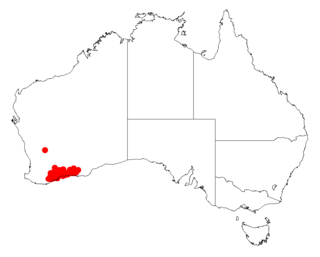
Acacia patagiata, also commonly knowns as salt gully wattle, is a shrub of the genus Acacia and the subgenus Plurinerves that is endemic to south western Australia.

Acacia subtilinervis, also known as the net-veined wattle, is a rare wattle in the Juliflorae subgenus found in eastern Australia.
Acacia nova-anglica, commonly known as New England hickory, is a shrub belonging to the genus Acacia and the subgenus Phyllodineae that is endemic to eastern Australia.

Acacia gracilifolia, commonly known as graceful wattle, is a shrub belonging to the genus Acacia and the subgenus Plurinerves native to a small area of central southern Australia.

Acacia leichhardtii, commonly known as Leichhardt's wattle, is a shrub of the genus Acacia and the subgenus Phyllodineae that is endemic to north eastern Australia.
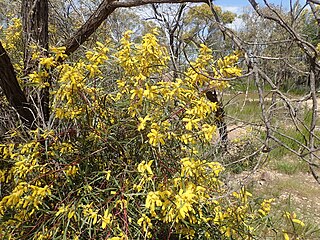
Acacia doratoxylon, commonly known as currawang, lancewood, spearwood or coast myall, is a shrub or tree belonging to the genus Acacia and the subgenus Juliflorae that is native to eastern and south eastern Australia.
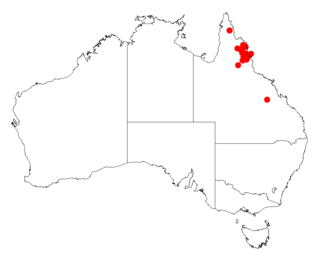
Acacia guymeri is a shrub belonging to the genus Acacia and the subgenus Juliflorae that is native to north eastern Australia. It was listed as vulnerable according to the Environment Protection and Biodiversity Conservation Act 1999 but was delisted in 2013. It is still listed as Vulnerable according to the Nature Conservation Act 1992 in Queensland.

Acacia leptostachya, commonly known as Townsville wattle or slender wattle, is a shrub or small tree belonging to the genus Acacia and the subgenus Juliflorae that is native to north eastern Australia.

Acacia tarculensis, commonly known as granite wattle, granite bush or steel bush is a shrub belonging to the genus Acacia and the subgenus Juliflorae that is native to south central Australia.
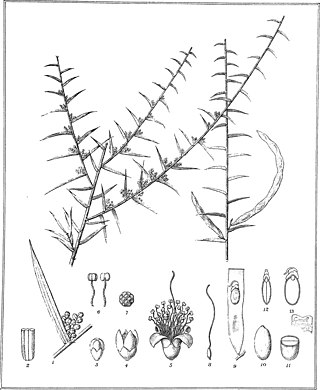
Acacia rhigiophylla, commonly known as dagger-leaf wattle, is a shrub belonging to the genus Acacia and the subgenus Juliflorae that is native to southern Australia.

Acacia elongata, also known as swamp wattle or slender wattle, is a shrub of the genus Acacia and the subgenus Plurinerves that is endemic to coastal areas of eastern Australia.

















